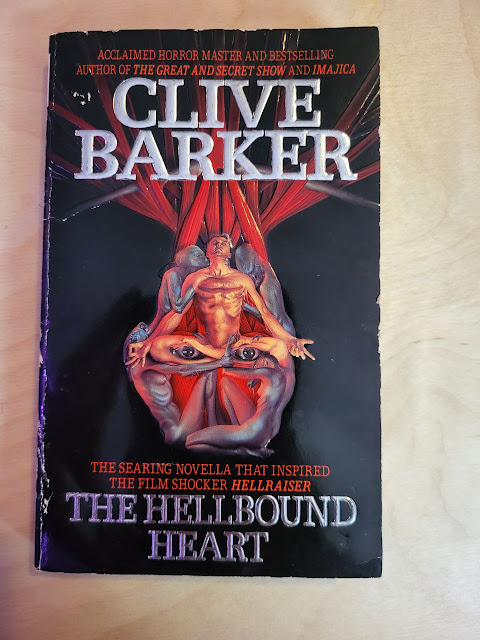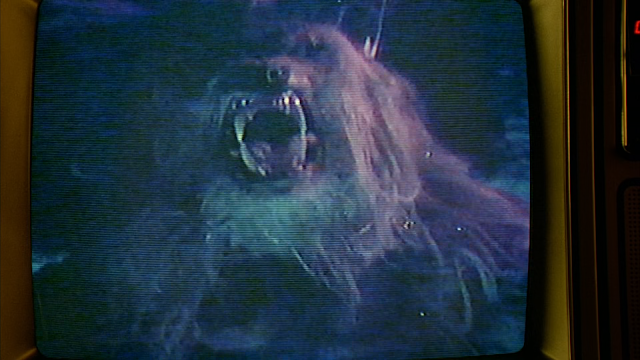Reading: The Hellbound Heart
It's been a while since I wrote a review, mostly because life has been busy with other (significantly positive!) things. As before, this is reading done with the Girls Guts Giallo book club, which is one of the many benefits subscribers get from the patreon page.
Now, I probably won't be shocking anyone with a review where I say that I liked The Hellbound Heart and think it's very good- it's Clive Barker and his work rules- but I do think that it's worth talking about since more people are likely familiar with Hellraiser and its subsequent franchise than the novella that spawned it.
My copy of The Hellbound Heart. Had to splurge for the good book cover.
Barker's writing is both luscious and evocative while being highly consumable, a style that is blunt but artful, descriptive without being stuffy. It's exactly the kind of writing you easily devour in an evening or two, which I did. It's fun how even the descriptions of gore and mutilation feel sexy and opulent with how they're staged by the Cenobites, even when you're also given sensory info like how bad the Cenobites smell. I rarely think about smell in films unless a character is reacting to it, so that's a dimension of experience added by reading the book. I suppose it makes sense that the medium dealing with audiovisual experience doesn't really make me think about taste, smell, or touch the way a book does.
The Hellbound Heart deals with love, or at least people's notions and expectations for love, as well as lust and pleasure. Frank, addicted to wild living and the pleasures of the flesh, seeks out what he thinks will be the ultimate pleasure from The Order of the Gash, a strange group of creatures called Cenobites which are summoned by a puzzle box. The problem, of course, is that their idea of pleasure has little to do with human concepts, instead dealing with extreme sadomasochism, torture, and body mutilation. Frank is dragged away into this dimension of torment, only to be brought back to the human world accidentally when his brother and sister-in-law move into the house he'd occupied. Julia, the sister-in-law, helps Frank return to life because she dreams of something better than her boring and unfulfilling marriage.
What's interesting between book and movie is that Kirsty, the heroine, is changed from a friend of Frank's brother Rory (who secretly is in love with him) to the daughter of Larry (who is Frank's brother in the film). Julia remains mostly unchanged- though she's the second wife and technical step-mother of Kirsty in the film- as does her adulterous history with Frank and her role in bringing victims to Frank in order to resurrect him. The daughter role in the film makes sense because it makes it easier to explain why she's there and why she's involved without having to go into further backstory, but it does considerably change the tone of the story. With Kirsty as a friend with an unrequited love for Rory, it meshes the theme of desire and longing together. Rory loves Julia and feels rebuked by her in their failing marriage, Julia loves Frank, and Kirsty loves Rory. Frank of course doesn't love anyone but himself. It's the world's most fucked up love triangle and it might as well be a puzzle box itself. It's hard not to view the whole thing as a damnation on marriage and heterosexual notions of romance.
Beyond the switch of Kirsty from friend to daughter, I don't feel like a lot changes or is lost in translation between book and film- the benefit of having the adaptation and direction by the author himself. I can definitely recommend reading the book and then seeing the film in short succession though if you're interesting in seeing how the two compare.
Barker does an excellent job painting the picture of marital dissatisfaction as well as detailing the inner lives of his characters. Julia, Rory and Kirsty feel like real, realized people whose motivations and inner workings make sense- their desperation, their wants and needs. That makes the horror of the situation hit harder, the fact that it's all believably woven together with the thoughts and feelings of people who are for better or worse, relatable and understandable.
Even Frank feels like a person who you can understand (though certainly not sympathize with), he typifies all the worst things about straight men who are allowed to go unchecked and unchallenged in their behavior all through life. He's the kind of guy that seems to always fail upwards and coast on his mediocrity- too uninterested to commit to any one thing for long. It was interesting to note that his own family was shocked and upset by his behavior but no one challenged him on it or barred him from events like weddings. We've probably all had the misfortune of meeting someone like Frank, the creep who keeps getting away with everything because he knows when to turn on the charm. There's probably something to be said about Frank in this book as a critique on masculinity as well as the kind of violence that exists and is quietly excused within familial units. The horror in The Hellbound Heart is as much domestic as it is extra-dimensional, with all the horrors occurring primarily within the four walls of an unassuming house in the suburbs.
Again, it really does feel like a great piss-up of heterosexuality (though that's my bias talking) and what people's notions of what romance and pleasure look like. It's hysterical when Frank imagines that the Cenobites will appear with oiled and pliable maidens, assuming what sex and sensuality would be for a group of otherworldly beings that have dedicated and ascended to a new realm of pleasure- as if such beings would have the same definition or idea of pleasure, let alone be restrained to only erotic hetero pleasure. Franks dissatisfaction with the pleasures of the real world are probably tied to a lack of imagination, let's be real. He can't even conceive of pleasure for the women he fucks- the description of his encounter with Julia being brutish and unrelenting and only good in her mind through the rose-tinting of time.
One thing that feels clear to me, having just basked in the lurid descriptions of erotically tinted blood and gore, is how much other horror owes to both The Hellbound Heart and to Hellraiser. The aesthetics of bdsm and sadomasochism are not ones I can easily recall as visuals in horror prior to Barker- at least not to this extent. Hellraiser is to kinky body horror as Alien now is to science fiction aping the biomechanical designs of Giger and replicating the Nostromo ad nauseum. I have to imagine how shocking picking this book up must have felt when it was new, or how it feels to be a young horror fan upgrading from dusty old HP Lovecraft to something like this. I imagine it feels the way I did when I picked up Naked Lunch for the first time as a teenager- shocking and exciting to realize books can be this way.
If you liked Hellraiser and feel disappointed by the sequel films and notions of franchise, definitely read The Hellbound Heart to get a better picture of the source. It's a definite page turner.


.png)

Comments
Post a Comment